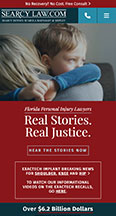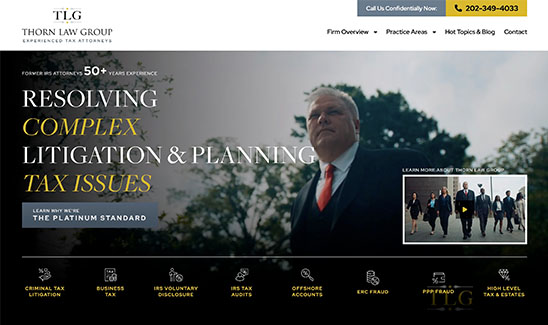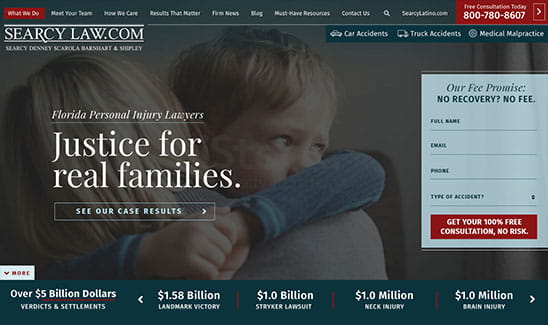Case Studies
EAT or E-E-A-T for Law Firm Content Writing
Demonstrate Experience, Expertise, Authority, and Trustworthiness
The basic principle of E-E-A-T is to make sure you let potential clients know of your experience as a lawyer. Have you actually practiced in their specific area of need, for example, copyright law? Have you handled a personal injury case that is similar to theirs?
Low-quality pages often lack an appropriate level of E-E-A-T for the topic or purpose of the page. Here are some examples:
- The content creator lacks adequate experience, e.g. a restaurant review written by someone who has never eaten at the restaurant.
- The content creator lacks adequate expertise, e.g. an article about how to skydive written by someone with no expertise in the subject.
- The website or content creator is not an authoritative or trustworthy source for the topic of the page, e.g. tax form downloads provided on a cooking website.
- The page or website is not trustworthy for its purpose, e.g. a shopping page with minimal customer service information.
Next, you need to demonstrate that you are an expert in that area. Yes, you are a lawyer, but you are competing against other lawyers. You need to showcase your specific expertise with your pedigree, education, awards, wins, and anything else that is notable to show off your knowledge.
For authoritativeness, the search engines will look to your overall reputation. Who are you? Have you been mentioned before? Cited? Are you well known?
Finally, for trustworthiness, this is the overall quality of your page. Is your page credible? Are you transparent with the content, author and clear contact information? Do you have an overall positive reputation?
Frequently Asked Questions About Our Content Writing Services
Our team can write bios, practice area pages, firm about pages, blogs, whitepapers, newsletters, guides, presentations, and more.
Our content writing typically ranges from $200 to $300 per page, but can vary by project.
We can turn around content in a few days to a few weeks, depending on the size of the project. Review our process chart for creating custom content.
Our content is written by attorneys and edited by a full-time employee on the content team at PaperStreet.
Determining What Makes Your Law Firm Unique
You must write about why clients should choose you. Some common questions to answer are as follows. Note that you only need one of these, so pick the best one.
- Being 1st. Being first showcases your experience. You may be the first law firm to practice, get a big win, go paperless, or win an appeal.
- Attribute Ownership. What is one distinctive characteristic, peculiarity, or feature of your practice? What can your firm say that no other firm can say?
- Be a Leader. Leadership positions automatically give respect and notoriety. What area are you a leader in? Why are you a leader in that area?
- Heritage. Having a history is a powerful way to brand the firm. When did you first start practicing, even if not at this firm? Do you have deep roots in your community?
- Specialize in your Market. Those that concentrate their practice area are assumed to be experts in their field. What can you say about your practice that no one else can claim?
- Preferred Provider. People trust firms that represent big names, large organizations, famous people, or have lots of clients. What names have you represented?
- Make your Service in a Special Way. Do you practice in an innovative way? Paperless? Unique case research? Library of documents to work with? All virtual?
- Be the Latest. Is your business new? Is it the latest trend? Did you start up practice to get away from doing it some other way?
How to Choose Topics for Blog
- Keyword Research – Start with keyword research. You need to figure out what people are searching for and then you can write.
- Target Audience / Personas – Figure out who your target audience is and create some mythical personas of a client.
- Outline – Create a Google Doc or MS Word and begin creating an outline of all your major headlines and subheads.
- People Also Ask – Run some Google searches and find the People Also Ask section, write on those specific topics.
- Related Search – Take a look at related searches and see if any other ideas need to be covered.
Content Writing by Lawyers for Lawyers
PaperStreet has a team of attorney writers to help with your specific needs.
SEO Best Practices for Legal Content
Some of the specific items you need to be aware of for SEO are:
- Title Tags: One of the most important tags on your website is the title tag. It tells search engines the overall topic of your page. It is used in ranking pages and displays in the search results.
- Meta Description: This is a nice pithy statement about the page, typically longer than a title tag and most often included in the search results too.
- H1: This is the headline of your page. Every page needs one. It can also be the same as your title tag or different
- H2 / H3: These are the subheads of your page. Each page should have a lot of H2 and H3 tags, depending on the length.
- URLs: Ideally your URLs are not too short and not too long. You should want to have keyword phrases in them and describe your topic.
- Internal Links: You should internally link all your key pages and related pages.
- Backlinks: Each key page of your site should get backlinks from other sites. At the very least, you want your homepage to get links.
- Original Content: You should not have AI-generated content or copy content from another source.
Outreach and Publication: Where to Publish Your Content
Most likely, you are going to publish your content on your own site, either as a practice area, guide, or blog post. However, you don’t necessarily need to publish everything on your site. You can also publish on other websites and get a link back.
- Own Site – Default
- Social Media – Post a new update and link to your page.
- Newsletters – Create a monthly newsletter and link to your page.
- Community / Forums – Answer questions, post guides, and link to your firm.
- Partners – Set up an outreach campaign to write articles and get links back.
How to Measure Web Content Success
You can measure the success of your website content in several ways:
- Inquiries – The best way is to track inquiries and revenue increases.
- Rankings – You can check your actual search rankings for those pages you created or updated.
- Traffic – You can check your actual analytics for increases in traffic.
- Client Happiness – You can also track whether you receive fewer questions from clients and are able to provide them with better guidance






